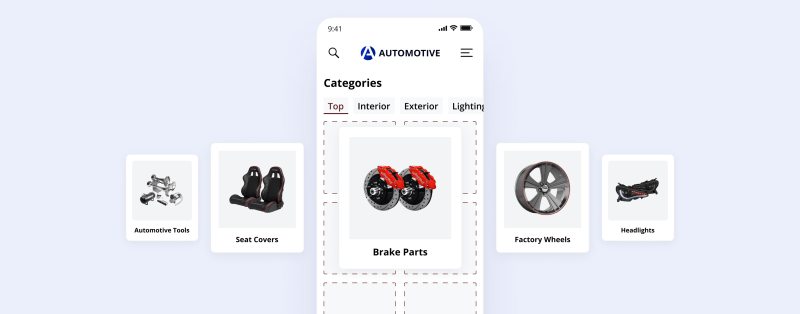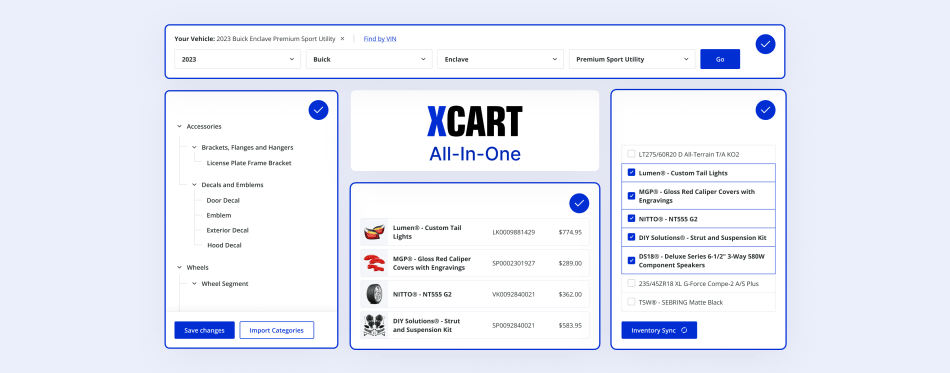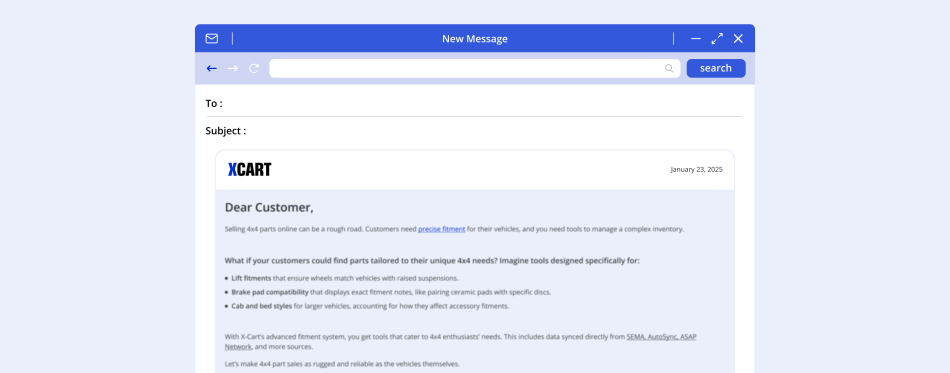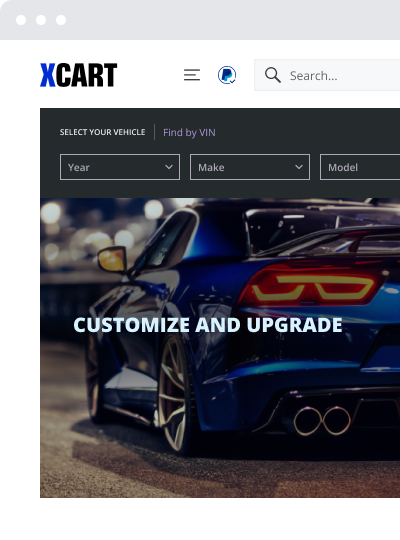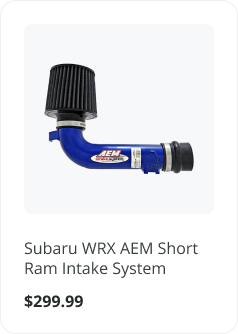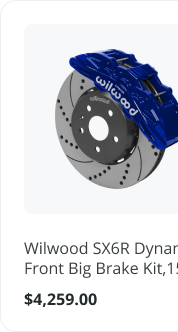Saving Time and Effort on eCommerce Catalog Management: Tips for Automotive Businesses
A well-structured eCommerce catalog is a cornerstone of each automotive online store. Even introducing the best strategies for selling auto parts online and finding the most effective ways to market your website will all be fruitless if your car parts catalog is a mess and customers fail to quickly and easily find the car part they are looking for.
This is where you’ll need a multifaceted, complex approach to your eCommerce product catalog management to help you efficiently add, structure, and update auto parts data. Below, we’ve highlighted the most crucial aspects of creating and maintaining your online catalog that we see as integral components of this complex approach:
C – Catalog Data Structuring and Synchronization
O – Options for Customization
M – Maximize Auto Parts Search Accuracy
P – PIES & ACES Compliance
L – Listings Enhancement
E – Extra Catalog Management Tools for Automotive eCommerce
X – X-Cart: Overcoming Data and Fitment Challenges
Let’s take a closer look at each of them.
1. Catalog Data Structuring and Synchronization
Years ago, before eCommerce started conquering the automotive world, creating and updating online product catalogs was time-consuming.
Unlike traditional brick-and-mortar product databases, digital catalogs are much more flexible and easier to maintain. There is still an option to add the products manually; however, thanks to the bulk editing feature, it now takes much less time to make changes to product details or pricing information.
Furthermore, with the proper automotive eCommerce software, you can automatically import all the necessary product data from trusted aftermarket data providers and fill your auto parts catalog.
Side note: At X-Cart, we have integrations with trusted automotive aftermarket data providers, such as SEMA Data, ASAP Network, and AutoSync. Connecting your online store to trusted and standardized databases allows you to automate your catalog management, map the categories you’d like to add or update, and sync product data across multiple channels.
The Main Benefits of Automated Commerce Cataloging
✓ Saving lots of time and effort
The vast amount of product information can be imported to your website in a few clicks. Thus, automation frees up your time to focus more on scaling your business and less on maintaining it.
✓ Keeping the auto parts catalog up-to-date
Automation is of immense help in regular product catalog information updates. Once connected to the data supplier, you can schedule updates in the admin area, and your data will be automatically renewed as often as needed.
✓ Ensuring auto parts fitment accuracy
With accurate and well-structured product data, auto parts sellers can streamline inventory management, reduce the risk of inaccurate orders, and ensure that customers get the right parts for their vehicles.
2. Options for Customization
API-driven, aka headless, eCommerce platforms, like X-Cart, can take catalog management to a new level. Headless commerce allows store owners to go beyond the default functionality and make the product catalog meet their business goals and customer needs.
Thus, if you do not find the required data provider or automotive distributor on the list of the ready-made add-ons you do not have to wait for the integration release. The in-house developers can implement any feature and integrate your online store with any software to help you optimize your auto parts catalog, build your own eCommerce ecosystem, and synchronize data across it. This is where broad customization capabilities come in handy.
X-Cart is all for adding exclusive features, custom car parts package builders, or essential applications for catalog management. X-Cart is more than just a commerce platform; we also provide custom design and development services to tailor your automotive website to your business needs.
Need a Custom Solution?
Get in touch with our web development team to begin discussing your individual business needs.
3. Maximize Auto Parts Search Accuracy
Since 2001, X-Cart has been helping hundreds of businesses sell online. What we’ve learned about supporting the automotive niche is that fitment accuracy is critical.
People do not choose auto parts as they look for apparel or other goods like this. They do not scroll pages comparing the items of different brands. They come exactly for a particular auto part that fits their car model. Forbes shares that 61% of website visitors go to another site if they don’t find what they’re looking for within approximately five seconds.
Keep your customers from getting lost in your product catalog! To ensure car part compatibility, you can use the following tools.
eCommerce search engine
The search engine is a must-have eCommerce feature, as many online shoppers head straight to the search bar when they need something particular.
At X-Cart, we have CloudSearch, a smart search and filtering engine. It empowers the customers to find the auto parts they need instantly. As a person starts typing, CloudSearch immediately autocompletes the request, corrects the spelling, and recognizes the synonyms. With the built-in analytics, you can determine whether you need to change the search rules to get your products discovered.
Year/Make/Model filters
This fitment search tool allows car parts buyers to instantly find the products made precisely for their vehicle among thousands of SKUs.
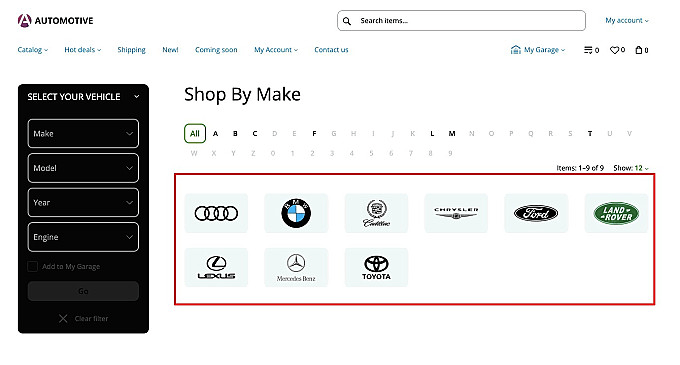
My Garage
This feature saves the buyer’s ‘car’ and vehicle data to the virtual garage. In case the customer returns to your store to buy another part for their car, they do not have to configure filters again.
In a short X-Cart Automotive Demo video you can see these automotive-specific features in action.
VIN lookup
This instrument enables finding compatible car parts by entering the vehicle identification number into the search bar on your website. VIN lookup can be considered as an alternative to Year/Make/Model filters, though having them both enhances search accuracy.
Utilizing any of these tools maximizes auto parts search accuracy and ensures that a product gets found if it is in your online store.
4. PIES and ACES Compliance
Data consistency is of utmost importance to automotive catalog management. The data providers rely on ACES and PIES standards to keep auto parts catalog information accurate for car parts buyers.
What are the ACES and PIES standards?
Aftermarket Catalog Exchange Standard (ACES) is a universal standard for compatibility information of parts and vehicles. It describes fitment data for automotive parts and helps the store owners sort the products by Year, Make, Model, type of engine, and other parameters.
Product Information Exchange Standard (PIES) is another automotive-specific standard focused on valuable product data and features like country of origin, materials, weight, etc.
By mentioning ACES and PIES, we recall the importance of the aftermarket data provider you choose and the quality of information you get (and give to your customers). Certainly, X-Cart, as an automotive-centric solution, has established partnerships with trustworthy companies that are aligned with the automotive industry standards. It all makes importing and maintaining catalog data safe and credible!
5. Listings Enhancement
According to Statista, up to 62% of digital buyers wish online shopping were more engaging. Thus, expending efforts on visual product appealingness can be a win-win situation for both parties; the customers get a better shopping experience, and the website’s SEO metrics might improve. Below, we touch upon these benefits:
Product Visualization
‘A picture is worth a thousand words.’ To give a more complete picture of what you sell, consider implementing the AutoSync visualizer. Wheels and tires sellers widely use this tool as it shows the desired products from different angles in real time.

As for the product information, it is possible to go beyond the ordinary product image and product description options. For example, the ‘Custom Tabs’ tool* enriches your catalog by adding new sections with product videos or PDF files (such as warranty coverage information, care and storage, and technical details).
* available for all X-Cart Automotive packages
Search Engine Optimization (SEO)
The longer the customer plays around with the product visualizer, the more time they spend on the page and the healthier it is for the SEO metrics of your website.
Most of us have heard that Search Engine Optimization is an essential part of running an online store. And yet, improving it continues to be a source of frustration for some sellers. To get to the top of Google search results, you can opt to hire a professional SEO service or manage it on your own. The basic things that auto parts sellers should keep in mind are their keyword strategy, on-page metadata, and content optimization.
6. Extra Catalog Management Tools for Automotive eCommerce
Along with the back end of catalog management, it is significant to configure the front end. Once your product pages have become polished, you might need the tools to attract customer’s attention to the additional products besides those that they want to buy in the first place.
What are the eCommerce tools that make conversion rate increase possible?
- Related Products is the feature that easily combines your product with other items to go with it. The HubSpot survey states that 74% of cross-selling merchants say it drives up to 30% of their revenue. Related Products can help you kill two birds with one stone: increase the average order value and boost customer loyalty. Another aim of this section is to remind the buyers about other popular things they may be interested in, such as floor mats, seat covers, etc.
- Products Bundle add-on improves website profitability by offering more products as a single package at a slightly discounted price. For example, a set of tires with 4 tire covers or an oil change bundle that includes engine oil and a filter.
- Product Variations compactly display all possible sizes on one product page. This feature is more of a pleasant shopping experience.
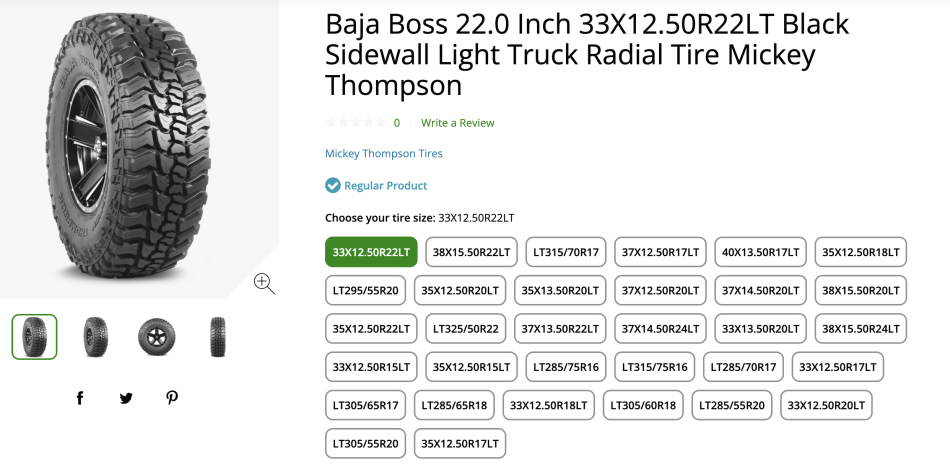
7. X-Cart: Overcoming Data and Fitment Challenges
X-Cart Automotive is an eCommerce platform designed specifically for online automotive businesses. It is fully equipped to support car parts sellers on every step of online store configuration, not only complex catalog management.
Payment processing, order fulfillment, shipping – X-Cart has hundreds of integrations to scale your business and offer an enjoyable shopping experience to your customers.
Our automotive-focused solution helps auto parts sellers overcome complex data and fitment challenges, thus staying competitive and profitable. Don’t take our word for it, read one of our case studies about how X-Cart assisted FS Parts with high-SKU catalog management.
Want a Similar Experience for Your Complex Auto Parts Catalog?
Summing Up
While newly-fledged auto parts sellers may underestimate the difficulty of managing auto parts data, experienced auto parts sellers know the pitfalls all too well.
However, adding and managing your product data is not a challenge with a complex strategy and a proper automotive eCommerce platform in your corner. As a result, auto parts sellers can benefit from guaranteed fitment accuracy, fewer product returns, and additional selling opportunities.
The key success factor in saving time and effort on catalog management is robust automotive-centric software that makes all complex tasks easier.
About the author

